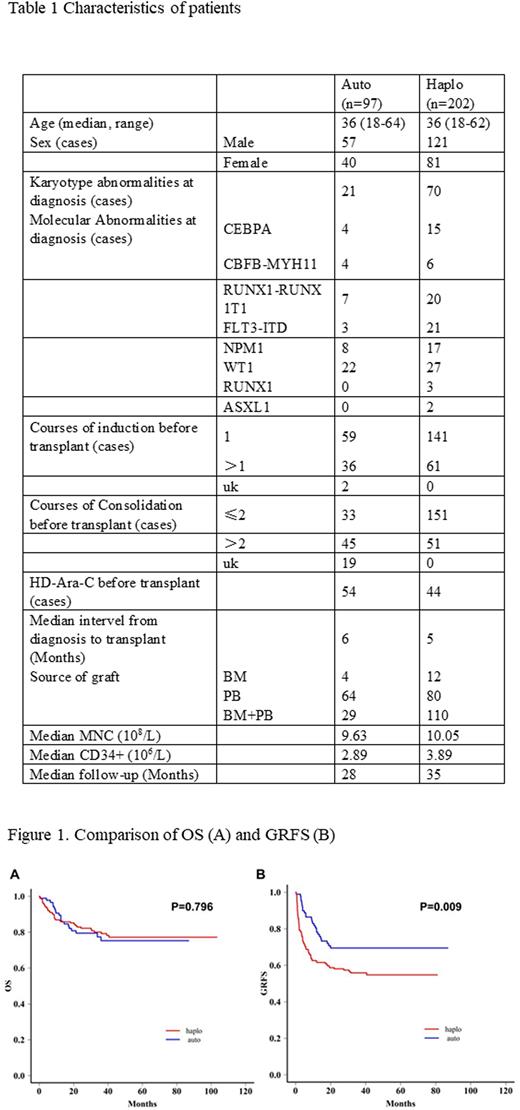Abstract
Background: Stem cell transplantation (SCT) is a potentially curative post-remission therapy for intermediate-risk acute myeloid leukemia (AML) patients. For patients in first remission (CR1) with negative measurable residual disease (MRD) and without a HLA-matched donor, both autologous SCT (ASCT) and haploidentical donor SCT (haplo-SCT) were acceptable options, but it is controversial that which one is preferred.
Methods: A retrospective study was conducted in 8 Chinese centers. The inclusion criteria were: 1) adult patients >18 years old; 2) diagnosis as AML with intermediate-risk according to ELN 2017; 3) ASCT or haplo-SCT underwent between 2010-2019; 4) in CR1 and MRD negative before transplant. The Primary endpoint was overall survival (OS). Secondary endpoints were progression-free survival (PFS), cumulative incidence of relapse (CIR), treatment-related mortality (TRM), and graft-versus-host disease-free and relapse-free survival (GRFS).
Results: Totally 299 patients were enrolled in this study, including 97 recepients after ASCT and 202 recipients after haplo-SCT (Table 1). The median follow-up was 28 months in ASCT group versus 35 months in haplo-SCT group. Compared to haplo-SCT, patients after ASCT had increased 3-year CIR (27.0% ± 0.2% versus 13.5% ± 0.1%, p = 0.004) but reduced 3-year TRM (3.5% ± 0.0% versus 12.0% ± 0.0%, p = 0.013), which led to similar 3-year OS (80.8% ± 4.3% versus 79.2% ± 3.1%, p = 0.796) and PFS (69.5% ± 5.0% versus 73.7% ± 3.3%, p = 0.504). Moreover, the 3-year GRFS was remarkable better in ASCT group (69.5% ± 5.0% versus 55.9% ± 3.6%, p = 0.009) (Figure 1), which implied a survival with superior quality of life (QoL). In multivariate analysis, haplo-SCT independently related to an improved CIR, while increased TRM and reduced GRFS. Additionally, age more than 50 was associated with the worse OS, CIR and GRFS.
Conclusions: We concluded that both ASCT and haplo-SCT were applicable for patients with intermediate-risk AML in MRD-negative CR1, but the absence of GVHD might potentially favor the QoL for patients receiving ASCT. Randomized trials are needed to confirm our conclusion.
Disclosures
Labopin:Jazz Pharmaceuticals: Honoraria. Mohty:Jazz Pharmaceuticals: Honoraria, Research Funding; Bristol Myers Squibb: Honoraria; Takeda: Honoraria; Amgen: Honoraria; Celgene: Honoraria; Astellas: Honoraria; Adaptive Biotechnologies: Honoraria; Novartis: Honoraria; Oncopeptides: Honoraria; Pfizer,: Honoraria; GSK: Honoraria; Sanofi: Honoraria, Research Funding; Janssen: Honoraria, Research Funding; Gilead: Honoraria.
Author notes
Asterisk with author names denotes non-ASH members.


